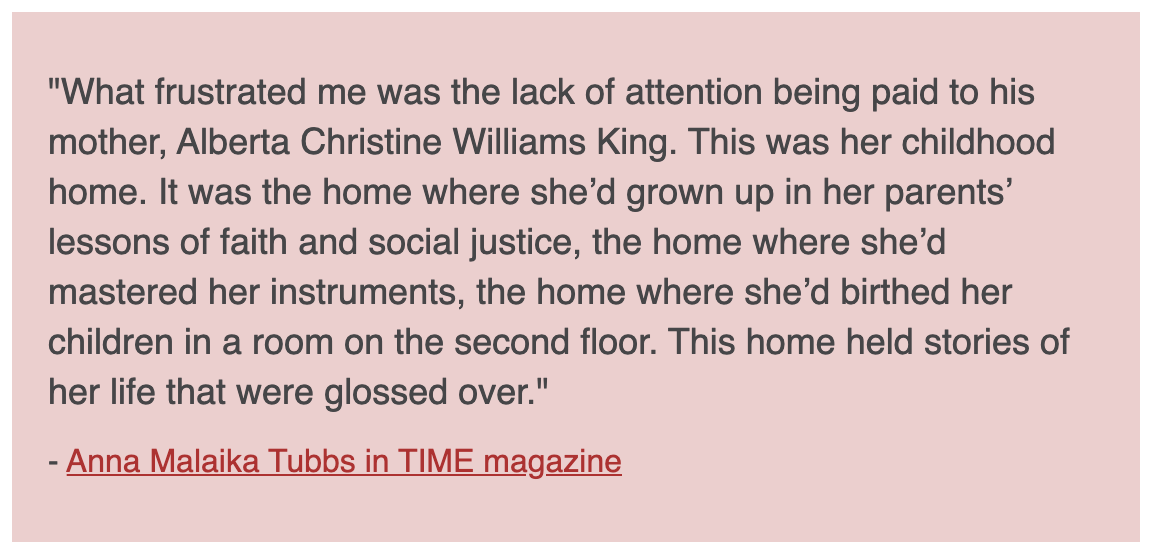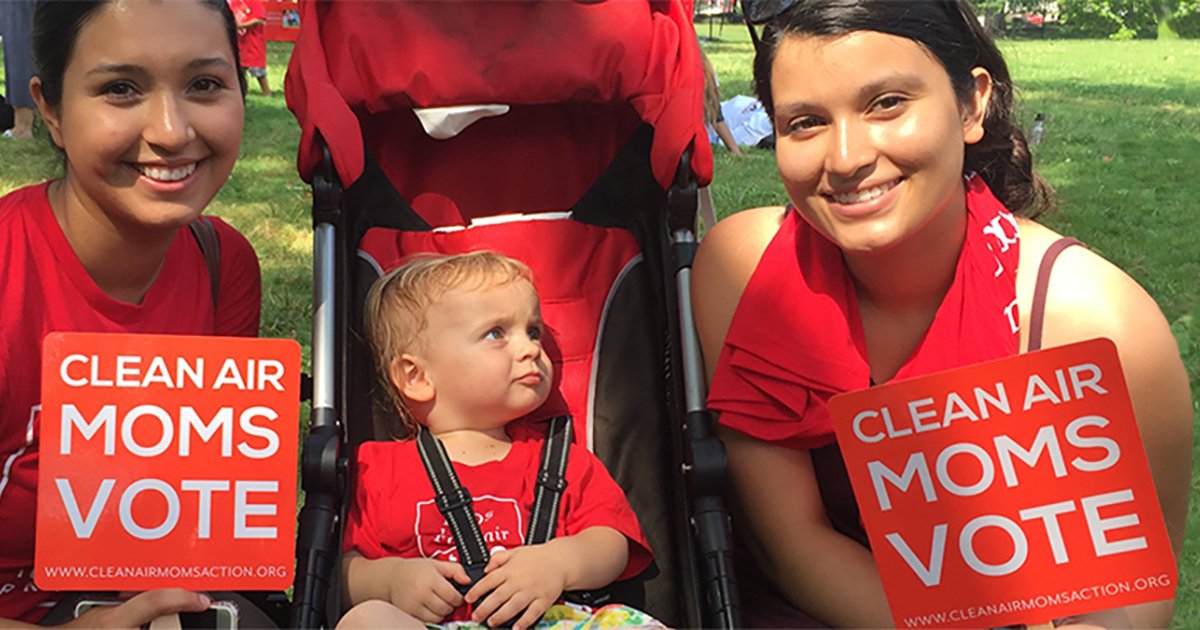I thought about all the ways I wanted to pay tribute to the great Dr. Martin Luther King, Jr. as this is the week we designate to remember and celebrate his leadership. But instead of adding to the much-deserved praise and many appreciations, I decided to write about his mother, Alberta Christine Williams King.
The idea that hers is a story to be remembered and celebrated is not mine, but comes from the work of an awesome young sociologist and author, Anna Malaika Tubbs, who spoke at TEDWomen21 this December.
King's family (l-r): Rev. Martin Luther King, Sr., Dexter King (son), Alberta Williams King (mother), Coretta Scott King (wife), Bernice King (daughter), Martin Luther King III (son), Martin Luther King, Jr., and Yolanda King (daughter). Credit: Atlanta City Design
“The world rightfully celebrates the birth of the great Martin Luther King, Jr." Anna observed in her talk. "Yet, virtually no one has stopped to consider who else was in that room that day in 1929. As if somehow MLK, Jr. birthed himself."
Anna had spent the past three years researching the lives of the mothers of Dr. King, Malcolm X and James Baldwin for her book, The Three Mothers: How the Mothers of Martin Luther King, Jr., Malcolm X, and James Baldwin Shaped a Nation, which also just came out in December.
As part of her research, she visited the childhood home of Dr. King, and she left feeling frustrated by the tour. "Of course, MLK Jr. was the center of most of the tales," she wrote in a piece for TIME magazine. "And then came stories about his father, the inspiring Reverend Martin Luther King Sr."
This week at CNN.com, Anna wrote of Alberta, "She was the daughter of the leaders of Ebenezer Baptist Church; it wasn't King's father who established the church, but his mother who inherited it from her parents. She didn't call it nonviolence, but she believed that you could fight Jim Crow through faith, marches and boycotts. She was one of the earliest members of the NAACP, as well as an active member of the YWCA and the International League for Peace and Freedom."
I recommend viewing Anna’s full TED Talk to discover more about Alberta and the other mothers of these men — Louise Little (Malcolm X) and Berdis Baldwin (James Baldwin) — who had enormous impacts on their communities and this country. We know so little about the person who was arguably the greatest influence on their lives — and on the lives of so many of us. Mothers.
The erasure or omission of women's stories, particularly Black women's stories, from history books, museums, obituaries and national holidays, is not surprising, but these omissions create a deficit in understanding the power of mothers for impact and influence.
Mothers are powerful," says Anna. "Mothers deserve support. It is time our stories and our policies reflect this." I believe this, but it’s worth noting that even from the most bipartisan perspective on national policies, there is a lack of alignment between a recognition of the importance of mothers in every family and in every community and the policies and programs that support their contributions, inside and outside the home.
In her compelling case for the stories and support for mothers, Anna adds:
"If the stories we told of mothers reflected their presence, their importance, their power, their influence, their wholeness and their humanity. Then it would be easier for everyone to appreciate their roles and back them with the support that they deserve" — support like paid leave, affordable child care, equal pay and unbiased health care.
When I served on a congressional commission to study the feasibility of creating a national Women’s History Museum in Washington, DC, we found that elementary school history textbooks typically mention three times as many men as women, five times as many for middle school, and six times as many for high school! And the stories of the mothers who birthed and nurtured and shaped the male leaders celebrated in these books are seldom, if ever, included.
The sad fact is that when we erase the stories of women on the frontlines of personal histories, we also downplay the vital contributions and powerful influence of mothers on the children they raise and in the work they create and lead in their communities.
So this week, along with expressing gratitude to Anna for her enlightening book and compelling TED Talk, I want to highlight the work of other mothers who are using their power and influence to shape a better future for everyone.
Mothers & Others for Clean Air
I’ll start with a mother I know, admire and love – my daughter in law, Laura Turner Seydel — who is a powerful influence on our whole family and admired way beyond our family for her passionate commitment to the environment and sustainability practices in the home and everywhere. In 2004, she and another activist Atlanta mother, Stephanie Blank, created Mothers & Others for Clean Air.
Two of the thousands of Mothers & Others for Clean Air members with a beneficiary.
The mission of Mothers & Others for Clean Air is to protect children’s health by reducing the impacts of air pollution and climate change in the Southeast. Through partnerships with scientists, healthcare providers, parents, teachers, youth, and organizations, they facilitate collective learning and specific actions that all mothers (and others) can take to ensure healthier air in a region of the country, the Southeast, where asthma and other pollution-related childhood diseases are of epidemic proportions.
As Laura reminds us: “Clean, healthy air is essential to good health. When you can’t breathe, nothing else matters. Climate change is a public health crisis and threatens the health of every person alive today, especially the children. The same dirty fuels that make air pollution are creating climate change, and we work to address both air pollution and climate change."
Laura adds, “Please contact your elected leaders at all levels (federal, state, and municipal) and tell them we need major action so we can breathe healthy air."
Laura, Stephanie, and all the mothers and the others who support their work, exemplify the impact that a group of mothers seeing a problem and taking action can have.
MomsRising
"First, a handful of women came together, and then that handful became hundreds, the hundreds became thousands, and through friends telling friends, MomsRising is now more than a million members strong and growing!"
MomsRising is committed to advancing policy and cultural change that make the world a better place for every mom and family.
Founded in May 2006 by Joan Blades and Kristin Rowe-Finkbeiner, MomsRising takes on "the most critical issues facing women, mothers, and families by educating the public and mobilizing massive grassroots actions."
Says founder Joan Blades, MomsRising's mission is "to increase family economic security, to decrease discrimination against women and moms, to fight racism, sexism and xenophobia, and to build a nation where businesses and families can thrive."
Never doubt the power of two mothers to unite, build a movement, and influence policy from their front doors to the doors of state legislatures, Congress and the UN.
Women without Borders
The power and influence of mothers is also being activated across community, country and cultural borders by Women without Borders (WwB), another organization started by mother, social scientist, author and activist Dr. Edit Schlaffer. Edit has spent the last 15 years researching the root causes of extremism and the radicalization of youth, especially in vulnerable communities. Her big finding? Mothers play a critical role in defending against radicalization.
2021 MotherSchool India graduating class.
In 2008, Schlaffer launched the Sisters Against Violent Extremism (SAVE) network, the world’s first female counter-extremism platform and started what she calls ‘MotherSchools: Parenting for Peace,’ a program that has been implemented across Bangladesh, Pakistan, Indonesia, India, Jordan, Tajikistan and Zanzibar, and more recently, in Europe across the Western Balkans in Montenegro, North Macedonia and Kosovo, and in Austria, Belgium, France, and Germany. Thousands of mothers, concerned about the influence of extremists in their communities and the recruitment of young men, in particular, to radical organizations and strategies, have been trained to recognize and respond to the early warning signs of radicalization.
Schlaffer says about her work: "SAVE and Women without Borders sends a strong message around the world that civil society can and should be the first line of defense against violent extremist ideologies, and mothers are the first line of defense in the home and family. MotherSchools focus on the potential of women, especially mothers, to recognize the early signs, to know how to counter the influences and together with other mothers, to shape new paths to peaceful coexistence.” I'm proud to serve on Dr. Schlaffer’s advisory council and learn more about how mothers, even in the most difficult circumstances, optimize the power of love, of nurturing and of connecting with other mothers to become forces for change and for a better future for their families, communities, countries and world.
This week and every week is a good one, in my opinion, to recognize mothers, to respect their influence, to celebrate their accomplishments and work, and to elevate their stories.
Onward!
-Pat







